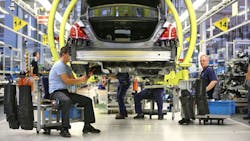Note to Trump: China and the EU Are Two Different Beasts
Trump Extends China Trade Truce, Citing Substantial Progress
“President Donald Trump said he’ll extend a deadline to raise tariffs on Chinese goods beyond this week, citing ‘substantial progress’ in the latest round of talks that wrapped up Sunday in Washington.”
Paul's Take: No previous administration has taken on the issue of China trade, so Trump should receive kudos for reining in China’s unfair and illicit practices. Whatever they deliver, these current talks should be only considered a first step towards developing a healthier trade relationship between our two countries.
EU Said Ready to Target Caterpillar, Xerox if US Hits Cars
“The commission said last month the EU would hit 20 billion euros (US$22.7 billion) of U.S. products should Trump impose duties on European cars and auto parts on the same national-security grounds that he invoked last year to tax foreign steel and aluminum.”
PT: The European Union is not China. In fact, the EU and the United States are pretty much tit-for-tat in trade practices, where they have their pet industries and we have ours. Threats are not the way to negotiate with partners, as the countries of the EU have supported U.S. policies in many ways over the years. Surely, we can do better than imposing tariffs on our friends and then having to face their retaliatory tariffs.
GM Hamtramck Plant, Set to Close, Gets an Extension
“GM notified employees, suppliers and dealers today that the plant would extend completion of the Chevrolet Impala and Cadillac CT6 through January.”
PT: This article brings up GM plant closing relative to discontinued product lines and future trends in components. It is significant that GM’s recently announced North American plant closings are not only related to changes in current market demand, but more closely tied to what the company sees as future product demand, i.e. electric powered vehicles and less demand for sedans. This proactive planning rather than reactive response is nice to see in a U.S.-based automobile manufactures, and GM management should be applauded for it. Of course, the issue of how the negative impact on employees and suppliers is addressed is also an important consideration.
3 Ways Manufacturers are Using Supply Chain Finance to Fund the Future
“Supply chain finance improves cash flow by allowing buyers to optimize their cash conversion cycle by focusing strategically on payment terms with their suppliers.”
PT: The essence of this article—although it is not laid out in these terms—is that by extending supplier payment terms, OEMs will have more available cash to finance operations and/or increase profits.
Are Your Suppliers in Trouble? Warning Signs and What to Do
“Tariffs, trade disputes and changes in consumer tastes can hurt your suppliers--and, in turn, you.”
PT: This article lays out the general background of current and future market trends that could negatively affect OEM suppliers. It also lists circumstances that may represent leading indicators that their suppliers are or will be in trouble. It ends with suggestions to how OEM could respond to such situations.
This article provides a good list not only of supplier “red flags” but also possible strategies to use with risky suppliers. It’s important to make a distinction between commodity and strategic suppliers. OEMs should consider more collaborative responses—such as sending in supplier development help to dig them out of their hole—when a strategic supplier is challenged, since re-sourcing can be much more expensive than providing assistance.
Paul Ericksen, IndustryWeek’s supply management advisor, will be a featured speaker at the Manufacturing Technology Conference in Pittsburgh. On April 2, he will lead a session in the Supply Chain track called “It Takes Two to Tango: How to Keep Both Suppliers and Customers Satisfied.” On April 3, Ericksen will conduct the workshop “Build-to-Demand: The Lean End Game.”
About the Author

Paul Ericksen
Executive Level Consultant; IndustryWeek Supply Chain Advisor
Paul D. Ericksen has 40 years of experience in industry, primarily in supply management at two large original equipment manufacturers. At the second he was chief procurement officer. He then went on to head up a large multi-year supply chain flexibility initiative funded by the U.S. Department of Defense. He presently is an executive level consultant in both manufacturing and supply chain, counting Fortune 100 companies among his clientele. His articles on supply management issues have been published in Industrial Engineering, APICS, Purchasing Today, Target and other periodicals.
